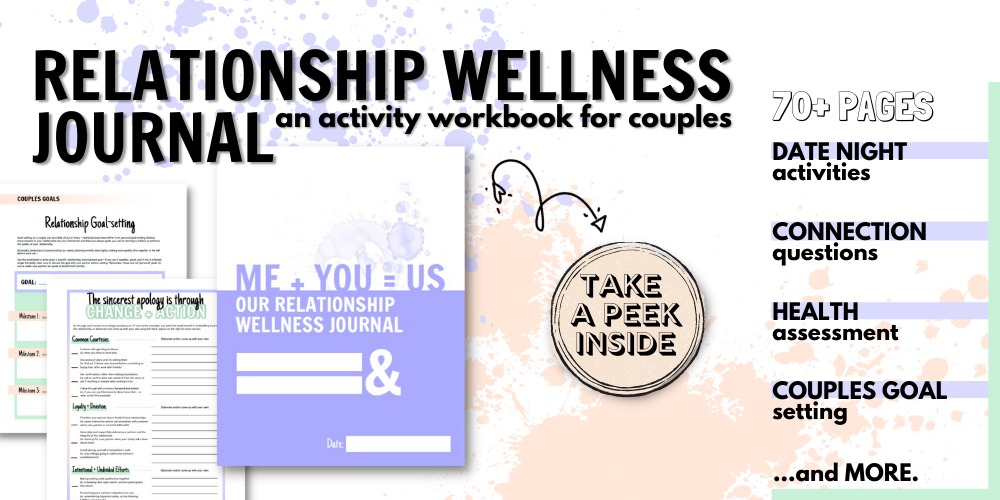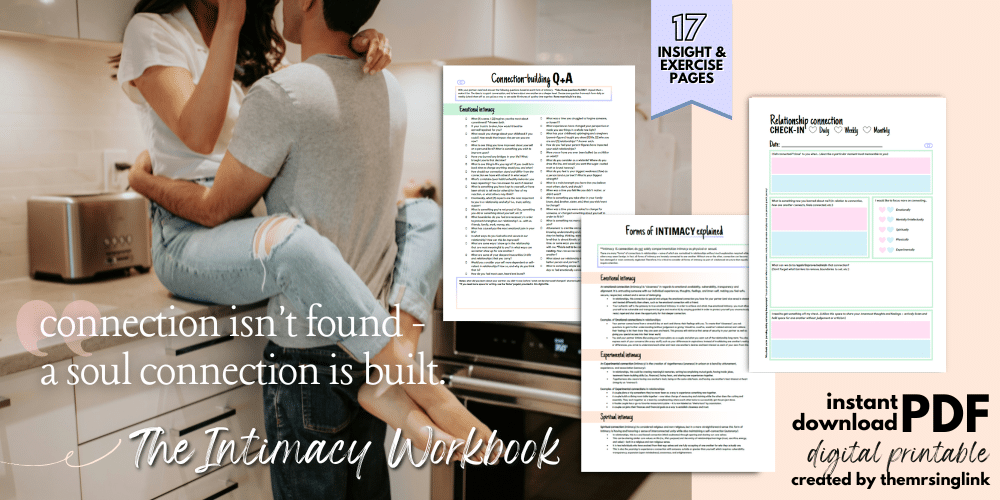I’d be lying if I said I have never felt disconnected from my husband. In fact, I realized it’s often because I am disconnected from myself – *oof*. And the older I get the more I value an emotional and intellectual connection in my marriage.
Point blank: it’s not uncommon to feel disconnected from your SO. But that doesn’t mean we should stop there and assume we never will. In every healthy relationship, there are 3 ways that can always help you to connect – or reconnect – with your spouse. Plus, be sure to download the 130 FREE re-connection questions that will deepen your marriage.
![3 Ways To Connect With Your Spouse [+ 130 Free Re-connection Questions] | Strengthen your relationship with questions that will help you connect | Connect with your spouse on a deeper level | Reconnect your marriage with these questions | Learn to verbalize with your spouse in order to reconnect in your marriage | Ways to reconnect with your spouse on a deeper level | #marriage #relationshiptips #healthyrelationships | theMRSingLink](https://themrsinglink.com/wp-content/uploads/2018/06/3-Ways-To-Connect-With-Your-Spouse-pin.jpg)
3 ways to connect with your spouse [+ 130 Free Re-connection Questions]
Ask questions
Want to know how to get answers? That’s right – by asking questions. Likely, part of the difficulty is having the questions to ask. This is both OK and not OK – if that makes any sense. The only reason this might be good is because you are already in tune to asking questions throughout your marriage (this might come naturally to you, but maybe you hit a road block now and then). When it’s not OK is if this is not of your norm, and you find that asking questions feels “unnatural” – or especially “unnecessary” – to you as part of connecting in your marriage.
Hold on a second – I’m not talking about, “Hey honey, how was your day?“
Think about when you first started dating your spouse. What usually connected you to them in the first place? Probably the things you learned about them, right? Who they are, what they like, how they live their life, their goals, attributes, personality, etc. etc. But there’s only so much you can learn from someone non-verbally – so you probably asked them a lot about the things you were interested in knowing.
Because a marriage means a lifetime with someone, who is to say that the person you marry is going to stay the exact same person you met – forever? People change. There is no other way around it. People change because of uncertainties, life changes, aspirations, grief and loss, parenting and child-bearing, overall health, goals, hardships, failures, successes, maturity and simply age. And there is more to that.
There are things my husband knew about me 5 years ago that I guarantee are no longer the same. Basically, I changed quite a bit in the last 5 years.
When my husband asked me for the first time – now 5 years ago – where I saw myself in 5 years – I bet he learned a lot about my life aspirations at that time. Five years has come and gone – does that mean he should stop asking me where I see myself in the next 5, 10, 15 years?
Needless to say, my husband truly knows so little about me.
You may have a lifetime to really get to know someone, but a lifetime is never a guarantee. So why wait? Why put it off, or wait for an opportune time (like on the brink of divorce) to finally ask the questions you should already be implementing in your marriage.
Have regular discussions
Now, I’m not trying to say it like you need to have daily, weekly or monthly marriage meetings – let’s try not to treat our relationship like a business here. But if you’re down to the wire (the last straw), maybe it needs to become that way.
Humans – we’re forgetful, we get lost in our own lives and emotions, and we make mistakes. This is constant – as much as it is inevitable. We must be willing to own up to that. And if structure is what helps keep your life in alignment, that may be the same needed for your marriage. And that’s more than okay.
Some of the most common discussions couples regularly need to have involve,
- Money and budget
- Marital roles
- Career goals and changes
- Life goals, aspirations and changes
- Household and parental duties/roles
- Health-related issues and changes
- Overall communication within the marriage (moreover on how to properly communicate with one another, especially during conflict)
[Related Read: 13 Vital Communication Skills That Will Save Your Relationship]

Learn to vocalize on certain topics
Maybe it’s just me, but I am not fully and emotionally connected to someone without vocalizing. And just like with mental health awareness – the happiest, most confident, joyous and loving, successful individuals can be the ones actually suffering the most.
The same way applies to marriage. That even the seemingly happiest spouse, or couple, can be the ones falling.
So if you’re not regularly talking or aiming to improve in all aspects of your marriage – all that is doing is neglecting what truly matters: the happiness and alignment within the marriage, and with your spouse.
Sex
Real talk – do you know more than 3 things your spouse enjoys sexually? Let me rephrase that question – do you know more than 3 non-generalized specifics your spouse enjoys sexually? Like the nitty-gritty stuff – what makes your spouse “tick” in the bedroom?
Have you ever had a serious conversation about your sex lives? Just because satisfaction might come obvious to you (ha – did you catch that?) without words, that isn’t always something to rely on.
Sure, sure, sure – “If my spouse isn’t happy with our sex life, they should be able to tell me..” Is that always the easy case? If you are rarely talking openly about your sex life to begin with, how is it going to be easy for your spouse to tell you when something is wrong, or they need something more?
As far as your spouse’s sexual needs, at this moment might be different from 6 months, or 6 years ago. So when was the last time you asked your spouse if they were truly satisfied in the bedroom?
Sexual desires, as well as interests, needs and drive can and will change! Maybe not drastically – but if your sex life together is a regular topic that you can easily bond over verbally, the word change won’t have the same definition ever again. Plus, getting to know exactly what satisfies both partners in the bedroom is bound to increase sexual connection, exploration, spontaneity, desire and satisfaction all around.
Intimacy (Emotional/Physical/Intellectual)
Not sex.
Intimacy is the connection you should be having during sex, but without the physical.
Intimacy is more than sex. It’s one-on-one time spent, closeness and togetherness, the longing for each other, and bonding in conversation – yes, even implementing what we call the romance, which is actually a form of expression. The key is expressing your love, emotions, and feelings whether by words, gestures and actions. Everyone’s version of emotional intimacy might be different, just like there are multiple forms of intimacy: emotional, physical and intellectual. And the desires for each can alternate at any given time.
That is why we must always be in tune with our needs, as well as our spouse’s. You won’t always be on the same page.
Expressing the individual desire for intimacy should never be frowned upon – it should be welcomed and encouraged. Why? Because, please point me in the direction of a couple who stays emotionally connected 24/7/365 – while getting it spot on 24/7/365. That’s why it’s important to remain open with our spouse, with the willingness to listen in order to learn.
Happiness (Personal + Marital)
Have you sat down with your spouse and openly and willfully asked if they were happy in the marriage? That question sounds partial because nobody truly wants to hear but one answer to that question. But seriously, had you ever thought about if your spouse was to turn around and say, “I haven’t been happy in the marriage for a while now…“
What would be your first thought? Probably, “Why haven’t you told me you felt this way?“
First off, why should there have to be a problem in order for there to be conversation about marital happiness? Most go to the dentist or doctor once a year (or at least should be) for a check-up – whether for a problem, or not – so can’t the same regular check-ups be implemented in marriage?
Most will say that talking about improving the marriage means there is currently an issue, and if there is no issue that affects the marriage (or both spouses), then there’s no reason to talk about it.
Couples must stop treating marriage, and relationships in that way. The duty of every spouse is not to focus on their own happiness, but each other’s. And in order for that to happen, spouses must take into consideration that sometimes happiness in the marriage can become unaligned – if we allow it. That just because you’re happy in the marriage, doesn’t mean the same for your spouse (and vice versa).
Talk often and openly, and make each other’s personal and marital happiness the sole importance.

Life Aspirations + Goals
Part of this has a lot to do with a surprise (though an inevitable one, I guess) that has entered the mix of my husband and I’s life aspirations. I knew the life I signed up for with my husband being a cop, and it comes with the inevitable speed bumps that can sometimes dictate our life’s path. But… that is called life, and I made the choice to support him in his career, just as he did mine.
Nonetheless, your life together should always, always be a topic of conversation. Whether that be a job promotion in a different city, a change in career or financial goals, sacrifices and challenges. Your lives together is not just your own – it’s both give and take, full of compromise and sacrifice, while relishing in the life you create together. Not only will communicating keep you both on the same page, it allows for each to mesh each of your personal goals and plans for the future.
Needs + Desires
Like I said – we’re all human. And we all have different needs and desires. So that means getting used to your partner having them and those needs and desires changing time and time again. If you can’t be a partner who is accepting and giving of those needs, or you don’t have a partner willing to do the same, then your marriage is missing a major chunk of what bonds you.
But more importantly, our needs being fulfilled in a marriage won’t even be successful if they are not spoken and understood.
download the free 130 questions
that will help strengthen the connection in your marriage, and relationship!
![3 Ways To Connect With Your Spouse [+ 130 Free Re-connection Questions] | Strengthen your relationship with questions that will help you connect | Connect with your spouse on a deeper level | Reconnect your marriage with these questions | Learn to verbalize with your spouse in order to reconnect in your marriage | Ways to reconnect with your spouse on a deeper level | #marriage #relationshiptips #healthyrelationships | theMRSingLink](https://themrsinglink.com/wp-content/uploads/2018/06/130-re-connection-Questions-To-Reconnect-With-Your-Spouse.jpg)